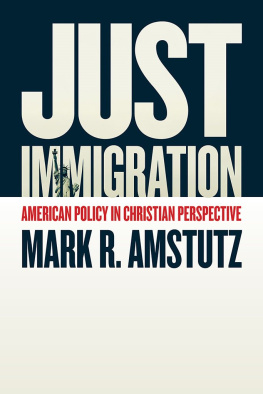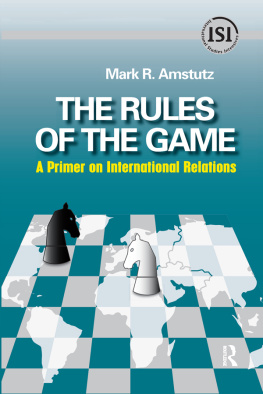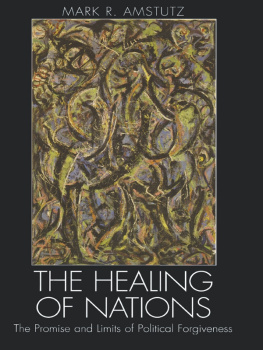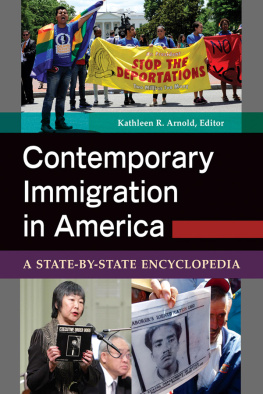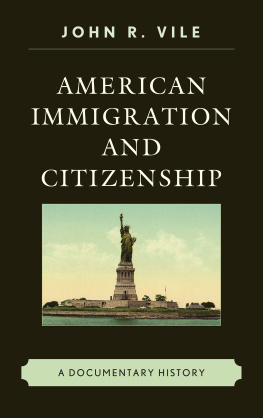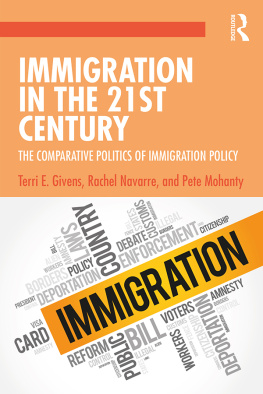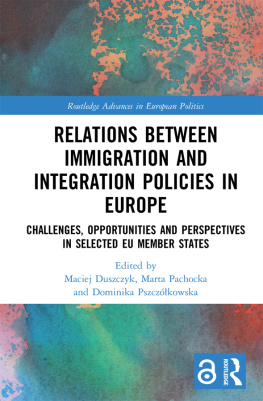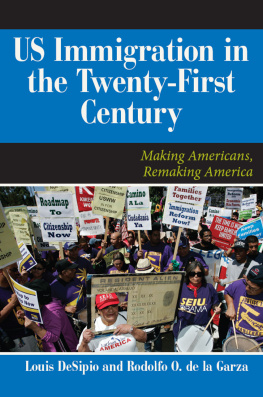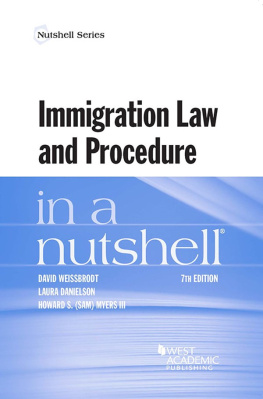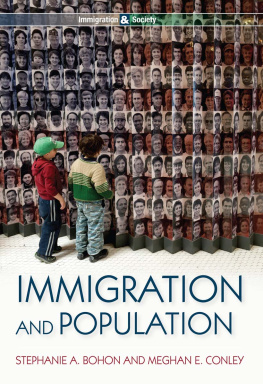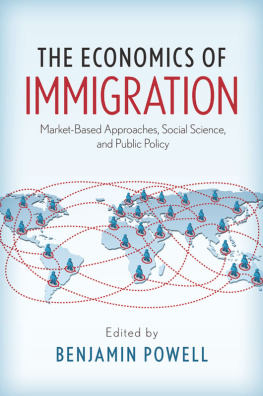Just Immigration
American Policy in Christian Perspective
Mark R. Amstutz
WILLIAM B. EERDMANS PUBLISHING COMPANY
GRAND RAPIDS, MICHIGAN
For my students
past and present
Wm. B. Eerdmans Publishing Co.
2140 Oak Industrial Drive NE, Grand Rapids, Michigan 49505
www.eerdmans.com
2017 Mark R. Amstutz
All rights reserved
Published 2017
23 22 21 20 19 18 171 2 3 4 5 6 7
ISBN 978-0-8028-7484-9
eISBN 978-1-4674-4678-5
Library of Congress Cataloging-in-Publication Data
Names: Amstutz, Mark R., author.
Title: Just immigration : American policy in Christian perspective / Mark R. Amstutz.
Description: Grand Rapids : Eerdmans Publishing Co., 2017. | Includes bibliographical references and index.
Identifiers: LCCN 2016058806 | ISBN 9780802874849 (pbk. : alk. paper)
Subjects: LCSH: Church and stateUnited States. | Emigration and immigrationReligious aspectsChristianity. | United StatesEmigration and immigrationGovernment policy.
Classification: LCC BR516 .A535 2017 | DDC 322/.10973dc23
LC record available at https://lccn.loc.gov/2016058806
Contents
Traveling with a group of religious leaders to the US-Mexico border near Douglas, Arizona, in March 2015, I witnessed aliens entering the United States unlawfully on two occasions. We stopped our vehicles on a hill where the border fence ended and where iron barriers had been placed to prevent vehicles, but not people, from entering the United States. As the sun was setting, two people darted across the border and ran into the Arizona desert. Soon after that, two Border Patrol all-terrain vehicles rushed to the vicinity where the two individuals had entered US territory, and within minutes of the border crossing, I saw the two individuals being walked back to the ATVs. On another occasion, I was traveling with a Border Patrol agent in the vicinity of Nogales, Arizona, when his radio alerted him to the fact that someone had scaled the eighteen-foot iron fence and run into the Arizona desert. Within a short time, that alien was found hiding in the dense brush and was taken away by another BP agent. Once the man was detained, I asked him in Spanish whether this was the first time he had entered the United States unlawfully. He responded that he had worked periodically as a roofer in Tucson and that this was his seventh illegal border crossing.
Although the United States has an elaborate immigration system to regulate entry into the country, my trip to the Mexican-American border in the Southwest certainly reinforced the belief that not everyone is following the established government rules. Getting permission to enter the United States from developed countries in the Westtemporarily for business or tourist purposesis relatively easy. However, getting a tourist visa from a low-income country or an unfriendly regime can be especially difficult. Securing a long-term (immigrant) visa is even more difficult, with delays ranging from five to twenty years. The concerns with border security are only one small dimension of a very complex and multidimensional policy concern: namely, what should be the policy toward foreigners who wish to come to work and live in the United States? Should the United States welcome an unlimited number of immigrants? If not, what should the annual admission ceiling be? And what should be the policy toward those who have entered the country unlawfully or have entered lawfully as tourists but have decided to remain in the United States?
My interest in US immigration policy was first sparked by the growing cry from American churches and Christian organizations for comprehensive immigration reform, including the legalization of migrants living in the United States without official authorization. Their impassioned advocacy made me want to understand the factors behind it: Why do they believe that the immigration system is unjust? Why do they believe that they have a unique contribution to make to the policy debate over immigration? More specifically, are the problems with the US immigration system due to the policies themselves, or do they arise from inadequate, inconsistent, and unpredictable enforcement of existing laws? Is the entire system bankrupt, or could modest, piecemeal reforms help to resolve some of the systems major shortcomings? Why are many Christian denominations and religious organizations advocating for comprehensive immigration reform? Finally, what explains the churches interest in this public-policy issue, and why do they overwhelmingly support a more liberal policy, including amnesty for those who have entered the country unlawfully? The effort to answer these and other questions led me to carry out an extensive, multiyear investigation involving scholarly research, immigration court visits, interviews with government officials and human rights activists, and visits to the Mexican border in the American Southwest.
This book is the result of my investigation. Since I am a scholar in the discipline of international relations, I write from the perspective of one who seeks to understand the nature and role of international migration from the perspective of the existing international political system of nation-states. And because of my previous work in international ethics, I am deeply concerned about the moral dimensions of transnational migration. Finally, because I am a Christian, I seek to understand how Christian perspectives help to structure the analysis of international migration.
The Plan of This Book
Therefore, this book describes and assesses the US immigration system from a Christian perspective. It examines the values and biblical perspectives espoused by Roman Catholic, Mainline Protestant, and Evangelical churches, and it assesses how these values and perspectives are applied in the ongoing debate about immigration reform. Since Christianity proclaims that all humans are created in Gods image and thus entitled to dignity and respect, Christian groups typically emphasize the fundamental rights of all persons, regardless of legal status, and call for compassionate and hospitable treatment of all migrants. But hospitality to strangers and compassion for migrants are inadequate pillars on which to build immigration policy.
Although Christian groups tend to acknowledge the decentralized nature of the contemporary world, the prevailing approach to immigration among Christian groups is a cosmopolitan perspective that highlights human welfare and de-emphasizes the regulatory policies of sovereign states. While biblical and theological norms are important in structuring the moral analysis of immigration policy, the task of applied ethics is not simply to set forth ideals but to illuminate how morality can contribute to a more humane and just world in generaland greater public justice within nation-states. Therefore, the analysis of this study begins by accepting the structure of a global society that is rooted in state sovereignty. In particular, it seeks to examine immigration in light of both the universal bonds affirmed by cosmopolitanism and the national loyalties of communitarianism.
This study explores the contributions and the limits of Christian ethics in the immigration debate. It examines how Christian norms can help structure the analysis and application of immigration reform in the United States. Since Scripture does not offer policy prescriptions on migration, I argue that Christian ethics provides a method for approaching the complex task of making and implementing immigration policy. At a minimum, a credible framework must involve: (1) competent knowledge of the problem; (2) an understanding of fundamental biblical/theological norms relevant to the issue; (3) a sophisticated integration of biblical morality with the issue; and (4) humility in advancing proposed analyses and recommendations.

